九年级英语Unit第3课时教案
新译林版英语九年级上册Unit3教案

What’s wrong with …?
Why not eat less and exercise more?
They don’t have time for me.
Perhaps you should manage your time better and go to bed early.
What should I do? Can you help me?
任务四:Discuss in groups and talk about your problems.
What problems do teenagers often have?
What advice do you have to help solve these problems?
Millie and Simon have some problems. They wrote to Mr Sigmund, a famous youth worker, and ask for some advice. Now let’s listen to her letter.
Task 1 listen to the letters andmatch the words on the left with the meanings on the right (Part B1).
3、根据漫画部分内容填空。
Eddies tells Hobo that he _____ a problem. He is ____ _____. He asks Hobo to have a look at his stomach. Hobo tells him that he eats too ______ and he asks him to eat ______ and exercise ______. But Eddie thinks that he can ______ the food for Hobo.
最新沪教版初中英语九年级上册精品教案 Unit 3 Family life Period 3
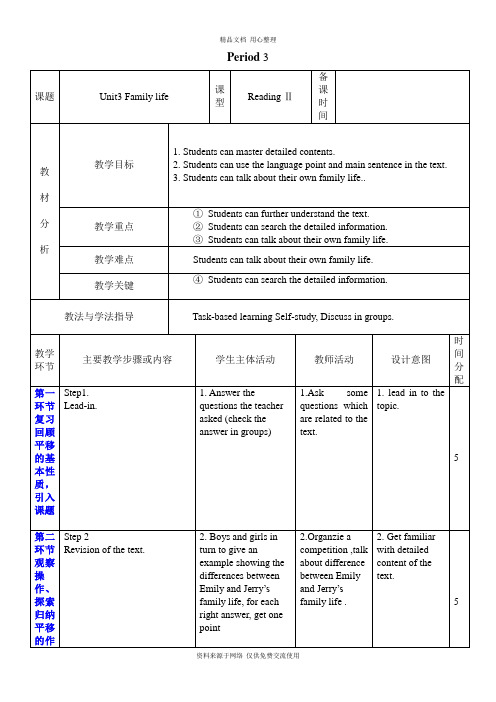
5
第二环节 观察操作、探索归纳平移的作法
Step 2
Revision of the text.
Step 3
Revision of the main sentence patterns.
2. Boys and girls in turn to give an example showing the differences between Emily and Jerry’s family life, for each right answer, get one point
5. Help them to develop good habit.
5
第五环节 课后作业
Ask students to write ten sentences to compare your family life with your best friends.
课
堂
教
学
流
程
Lead in →Revision of the text→Revision of the main sentence patterns.
5
15
第三环节 课堂练习
Step 4 Group discussion
4. ①Talk about the own family life of the students in group.
②A leader to report and judge whose family life is beter
3. Students can talk about their own family life..
教学重点
1Students canfurther understand the text.
人教版九年级英语全册教案:Unit 3教案

Unit 3Could you please tell me where the restrooms are?教学设计知识目标课堂环节§自主学习案翻译下列词组。
1.买一些邮票buy__some__stamps2.得到关于……的信息get__some__information__about…3.打扰了excuse__me4.向左/右转turn__left/right5.经过书店go__past__the__bookstore6.在……和……之间between__…__and__…7.在左/右边on__the__left/right8.在那边over__there9.在二楼on__the__second__floor10.买一双鞋get__a__pair__of__shoes§课堂导学案Step 1 准备与热身(Preparation)Show pictures to the whole class, one student explains the places in English and another one who doesn't look at the blackboard guesses what place it is.For example, one student says: We can save money or exchange money in this place, another one guesses it is a bank.Get students to guesses the places like bank, post office, bookstore, museum, bathroom, washroom, mall and so on.T: You're new to this school.You need to know where the main office is.How can you ask where the main office is?S: Where's the main office?T: That's one way to ask.But there is a more polite way you can ask.Can you say some of them ?Students:__________________① Can you tell me where Classroom 1 is?② Could you tell me how to get to Classroom 1?……Step 2 呈现与输入(Presentation)1.要求学生翻开课本P17,要求学生查看1a下方的图片并与方框中所给动词短语的描述搭配起来。
九年级英语全册Unit3Couldyoupleasetellmew3Grammarf教案

Unit 3 Could you please tell me where the restrooms areSection A 3 (Grammar focus-4c)Step 1 Revision1. How did Alice and He Wei think of the new ride?Students say the sentencestogether?Alice thought that it looked pretty scary. He Wei thought that it would be fun.2. After the ride, Alice and He Wei talked about their feeling.Alice thought that was fun! She was scared at first, but shouting really did help.He Wei told Alice that “You never know until you try something.”3. Alice and He Wei talked about Uncle Bob’s.Alice thought this restaurant looked interesting. It seemed a rock band plays there every evening.He Wei suggested that they could have dinner there.Step 2 Grammar Focus1) Let students complete the sentences.1. 打扰了,你知道我能在哪买到一些药?Excuse me, do you know where ____ _____ buy some medicine?2. 当然,顺着这条街有个超市。
冀教版九年级英语上册教案 Unit 3 第3课时
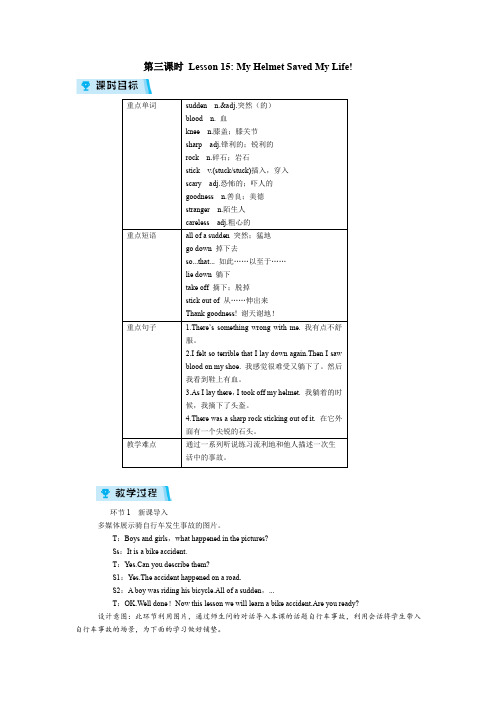
第三课时Lesson 15: My Helmet Saved My Life!环节1 新课导入多媒体展示骑自行车发生事故的图片。
T:Boys and girls,what happened in the pictures?Ss:It is a bike accident.T:Yes.Can you describe them?S1:Yes.The accident happened on a road.S2:A boy was riding his bicycle.All of a sudden,...T:OK.Well done!Now this lesson we will learn a bike accident.Are you ready?设计意图:此环节利用图片,通过师生问的对话导入本课的话题自行车事故,利用会话将学生带入自行车事故的场景,为下面的学习做好铺垫。
环节21. Read the lesson and do Exercise 1 on Page 39.2.Read the article aloud after the recorder. Then let the students listen to the tape and repeat it sentence by sentence.3.Do the Exercise 1and 2on page 39 ,and check the answers.4.Work in group of 8 to find out the key words,phrases and sentences.5.The teacher explains the article.6.Ask the student’s to finish the Exercise 3, then check the answers.7.要点点拨(1)There’s something wrong with me.我有点不舒服。
人教版英语九年级全册Unit3 Writing优质课教案

Unit3 Writing优质课教案教学目标〔Teaching objectives〕:1、知识与能力(Knowledge and ability objects): 礼貌地向他人询问信息和为他指路。
2、过程与方法(Method objects):观察周围环境并用恰当的语言去描述,师生对话,小组活动,借助多媒体和挂图来提高学生的主动性。
3、情感目标(Moral objects ):通过观察和指路,增进人与人之间的关系,学会做一个有爱心的人,关心身边的家人和朋友。
教学重点(The important point)1、The vocabulary: the way to…, turn right, across from, next to, go down/along, visit, at the gate2、Language:Would you please tell me the way to the post office? / Could you please tell me ...?教学难点(The difficult point ):Use the language to talk about direction.教学过程(Teaching procedures):Step 1 Warming-up and Leading in (4 mins)1、T: Boys and girls, please turn these phrases into English1、通往……的路2、乘出租车3、路过4、在……和……之间5、停车场,停车区6、在……的隔壁;在……的旁边7、百货商店8、期待Check the answers , call the Ss to read the answers.参考答案:1. the way to ...2. take a taxi3. pass by4. between …and…5. parking lot / car park6. next to…7. department store8. look forward to2、T: Fill in the blank with right phrases (4 mins)1、我很快乐你要来看望我的爸爸。
人教版英语九年级全册-Unit 3 SectionA (3a—3b)教案
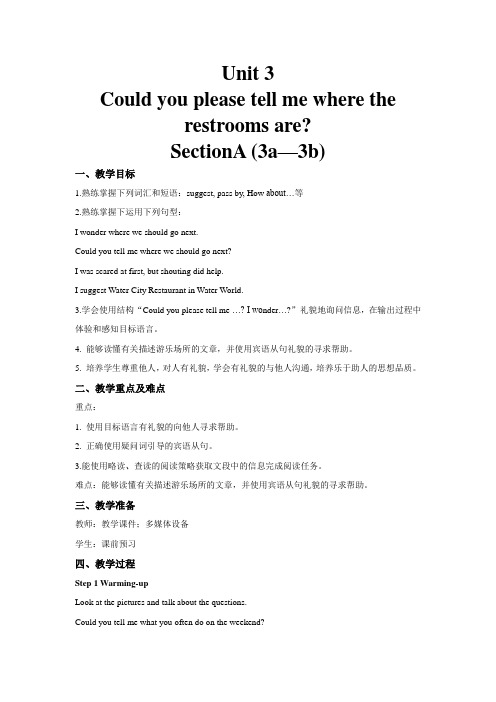
Unit 3Could you please tell me where therestrooms are?SectionA (3a—3b)一、教学目标1.熟练掌握下列词汇和短语:suggest, pass by, How about…等2.熟练掌握下运用下列句型:I wonder where we should go next.Could you tell me where we should go next?I was scared at first, but shouting did help.I suggest Water City Restaurant in Water World.3.学会使用结构“Could you please tell me …? I wo nder…?”礼貌地询问信息,在输出过程中体验和感知目标语言。
4. 能够读懂有关描述游乐场所的文章,并使用宾语从句礼貌的寻求帮助。
5. 培养学生尊重他人,对人有礼貌,学会有礼貌的与他人沟通,培养乐于助人的思想品质。
二、教学重点及难点重点:1. 使用目标语言有礼貌的向他人寻求帮助。
2. 正确使用疑问词引导的宾语从句。
3.能使用略读、查读的阅读策略获取文段中的信息完成阅读任务。
难点:能够读懂有关描述游乐场所的文章,并使用宾语从句礼貌的寻求帮助。
三、教学准备教师:教学课件;多媒体设备学生:课前预习四、教学过程Step 1 Warming-upLook at the pictures and talk about the questions.Could you tell me what you often do on the weekend?Have you ever been to an amusement park?What did you do there and what did you think of it?【设计意图】通过探讨学生熟悉的话题,引起学生的学习兴趣,并为3a教学活动做好铺垫。
人教版九年级 Unit 3 Could you please tell me where the restrooms are知识点教案
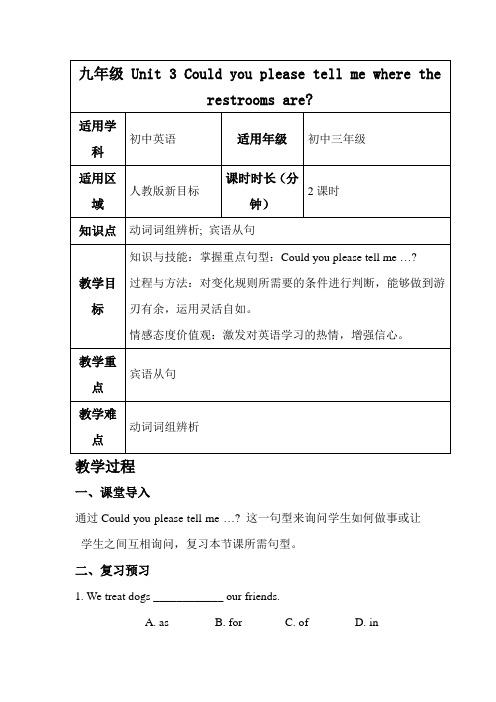
教学过程一、课堂导入通过Could you please tell me …? 这一句型来询问学生如何做事或让学生之间互相询问,复习本节课所需句型。
二、复习预习1. We treat dogs ____________ our friends.A. asB. forC. ofD. in【答案】A【解析】本题考察介词搭配,“把……当……对待”用treat sb. as/like…,故选A。
2. Mr. Mao ____________ for 35 years.A. diedB. dyingC. has been deadD. death 【答案】C【解析】本题考察现在完成时,“死”的延续式是be dead。
3. Not only Tom but also Mike __________ English very much.A. likeB. likesC. to likeD. liked【答案】B【解析】本题考察not only … but also…做主语,谓语动词采用“就近原则”。
4. We all went to the park __________ Tom. We played happily together.A. besideB. besidesC. exceptD. by【答案】B【解析】本题考察介词,根据句意:除Tom外,我们也都去了公园。
故选B。
5. ---Could you tell me __________?---Yes, there is one between the school and the post office.A. where the bookstore isB. where is the bookstoreC. how far is the bookstore isD. how far the bookstore is【答案】A【解析】本题考察宾语从句,用陈述语序,排除B和C;根据句意选A。
九年级英语下册 Unit3精品教学案(共10课时) 牛津译林版

9B Unit 3 Asia9B Unit3 Asia参考答案总1课时一、1. Although 2. if, invited 3. journey, have a rest 4. woke up, found, stolen5. Have, watched, dance6. feet, tired7. continue to, end二、have, went, whom, How, for总2课时一、1. dynasties 2. furniture 3. heavenly 4. filled 5. gathered6. raising7. north-west8. landscape9. man-made 10. experienced二、1. attraction 2. tiring 3. surprised 4. beauty 5. to cycle总3课时一、1. build 2. close 3. cities 4. northern 5. easily6. was changed7. raising8. natural9. attactaction 10. wonders二、1. tiring, step by step 2. gathered, so that 3. has experienced4. imagine, beauty, unless, with, own5. in strange shapes总4课时DADD总5课时一、1. I go to school so that I can learn knowledge. 2. so, to carry3. I went on working although I got tired.4. If, don’t, won’t二、1. He works so hard that he can pass the exam.2. He runs so quickly that no one can catch up with him.3. Tom boght a lot of books so that he could learn a lot of knowledge.]4. The flower looks so beautiful that I want to take it home.三、1. Although 2. unless 3. if 4. because 5. While 6. when 7. so that总6课时一、1. culture 2. Asia 3. surprise 4. imformation 5. arrived二、1. so energetic that 2. so, that 3. so that总7课时一、1. is famous for 2. is leaving/will leaving …for3. for one more week4. go on holiday5. fly to二、1. host, Seoul 2. an important role 3. In total, countries, took part in4. first, lose, using总8课时一、1. playing 2. cook 3. tasty 4. easily 5. have been built二、1. more, so that 2. really necessary, stop 3. instead of4. busy cleaning5. are attracted by。
外研版九年级英语上册Module 3 Unit 3教案
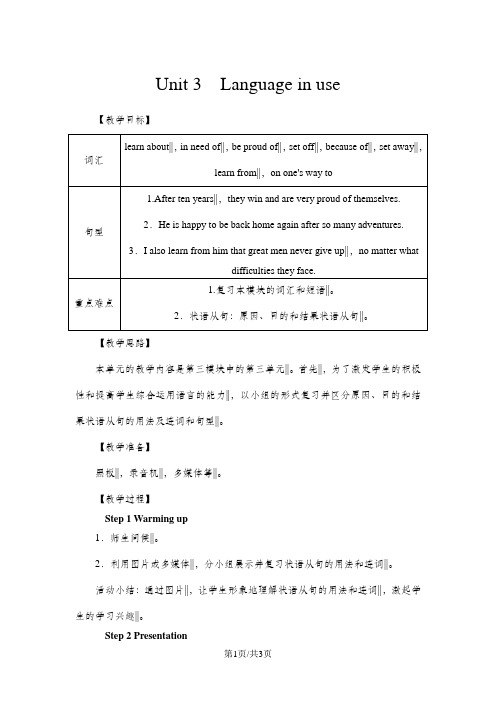
Unit 3Language in use【教学目标】【教学思路】本单元的教学内容是第三模块中的第三单元||。
首先||,为了激发学生的积极性和提高学生综合运用语言的能力||,以小组的形式复习并区分原因、目的和结果状语从句的用法及连词和句型||。
【教学准备】黑板||,录音机||,多媒体等||。
【教学过程】Step 1 Warming up1.师生问候||。
2.利用图片或多媒体||,分小组展示并复习状语从句的用法和连词||。
活动小结:通过图片||,让学生形象地理解状语从句的用法和连词||,激起学生的学习兴趣||。
Step 2 Presentation利用多媒体呈现几组状语从句的句子||,让学生翻译并区分||。
Many people were dying because they did not get to hospital quickly enough.There were few doctors||,so he had to work very hard on his own.He wrote books so that they could learn about how he treated the sick.Step 3 Practice1.让学生独立完成Activity 1||,正确运用:because||,so||,so that||,并了解宇航员Yuri Gagarin的故事||。
2.利用Activity 2的句子和提示||,练习连词的用法||,并了解著名人物的事迹||。
3.利用Activity 3的问题||,进行小组活动||,练习原因状语从句中“because”的用法||。
活动小结:多种形式复习状语从句的连词的用法||,充分调动学生们的学习热情||。
Step 4 Complete the sentences1.Let students complete the sentences with the correct form of the words in the box.Then check the answers.(Activity 4)2.Let students complete the sentences with the correct form of the expressions in the box.Then check the answers.(Activity 5)Step 5 Listening1.让学生自己先看懂Activity 6中的问题||,两人或几人一组进行讨论||。
人教版新目标九年级英语unit3教案
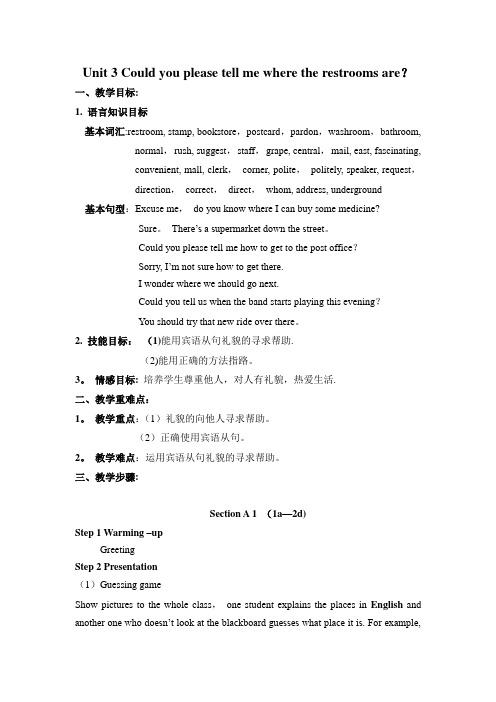
Unit 3 Could you please tell me where the restrooms are?一、教学目标:1. 语言知识目标基本词汇:restroom, stamp, bookstore,postcard,pardon,washroom,bathroom, normal,rush, suggest,staff,grape, central,mail, east, fascinating,convenient, mall, clerk,corner, polite,politely, speaker, request,direction,correct,direct,whom, address, underground基本句型:Excuse me,do you know where I can buy some medicine?Sure。
There’s a supermarket down the street。
Could you please tell me how to get to the post office?Sorry, I’m not sure how to get there.I wonder where we should go next.Could you tell us when the band starts playing this evening?You should try that new ride over there。
2. 技能目标:(1)能用宾语从句礼貌的寻求帮助.(2)能用正确的方法指路。
3。
情感目标:培养学生尊重他人,对人有礼貌,热爱生活.二、教学重难点:1。
教学重点:(1)礼貌的向他人寻求帮助。
(2)正确使用宾语从句。
2。
教学难点:运用宾语从句礼貌的寻求帮助。
三、教学步骤:Section A 1 (1a—2d)Step 1 Warming –upGreetingStep 2 Presentation(1)Guessing gameShow pictures to the whole class,one student explains the places in English and another one who doesn’t look at the blackboard guesses what place it is. For example,one student say: We can save money or exchange money in this place,another one guess it is a bank。
九年级英语上册 Unit 3教案和练习 冀教版
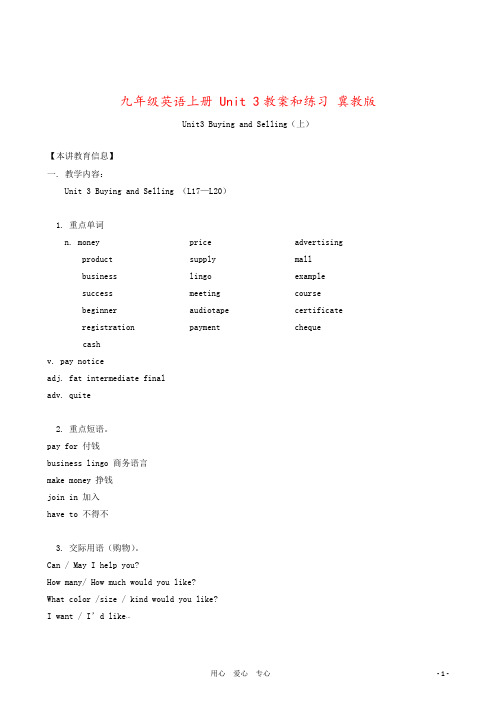
九年级英语上册 Unit 3教案和练习冀教版Unit3 Buying and Selling(上)【本讲教育信息】一. 教学内容:Unit 3 Buying and Selling (L17—L20)1. 重点单词n. money price advertising product supply mallbusiness lingo examplesuccess meeting coursebeginner audiotape certificateregistration payment chequecashv. pay noticeadj. fat intermediate finaladv. quite2. 重点短语。
pay for 付钱business lingo 商务语言make money 挣钱join in 加入have to 不得不3. 交际用语(购物)。
Can / May I help you?How many/ How much would you like?What color /size / kind would you like?I want / I’d like…How much is it?That’s too expensive. I’m afraidDo you have another color/size?That’s fine, I’ll take it.二. 重点、难点解析及词语辨析:1. Our basketball team has been invited to another city. 我们的篮球队已经被邀请到另一个城市去比赛。
(L17)invite 意思是“邀请”,固定搭配有: invite sb. to do sth. 邀请某人做某事invite sb. to someplace 邀请某人到某地去①I invite all my friend to my birthday party.我邀请了我全部的朋友来我的生日聚会。
人教版九年级英语 Unit3 优质课教案(全)
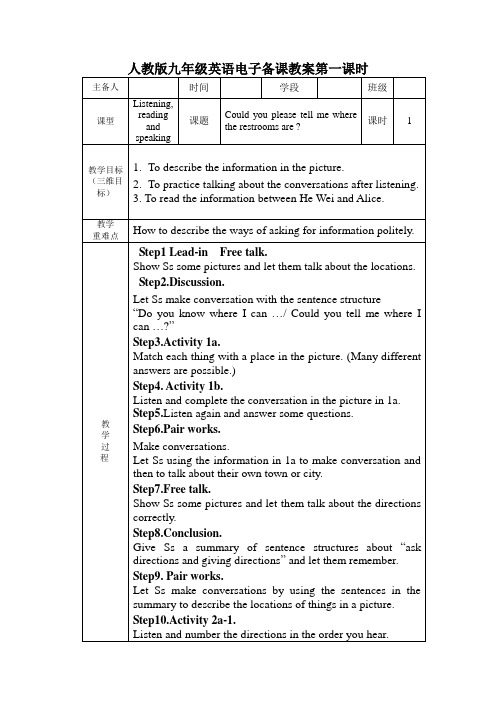
Step7.Free talk.
Show Ss some pictures and let them talk about the directions correctly.
nguage points:
explain the key words and phrases in section A-2
教学
反思
人教版九年级英语电子备课教案第三课时
时间
学段
班级
课型
Gou tell me where the restroom are ?
—Sorry,I’m not sure how to get there.
3.Iwonder where we should go next.
—You should try that new ride over there.
4.Could you tell us when the band starts playing this evening?
Step7.More exercises.
1.Choosing the right answers.
plete sentences.
3.Exchanges of sentence structures.
The exercises of Secondary School Entrance Exams
Step8.Conclusion.
Give Ss a summary ofsentencestructures about“ask directions and giving directions”and let them remember.
人教版九年级英语unit3教案
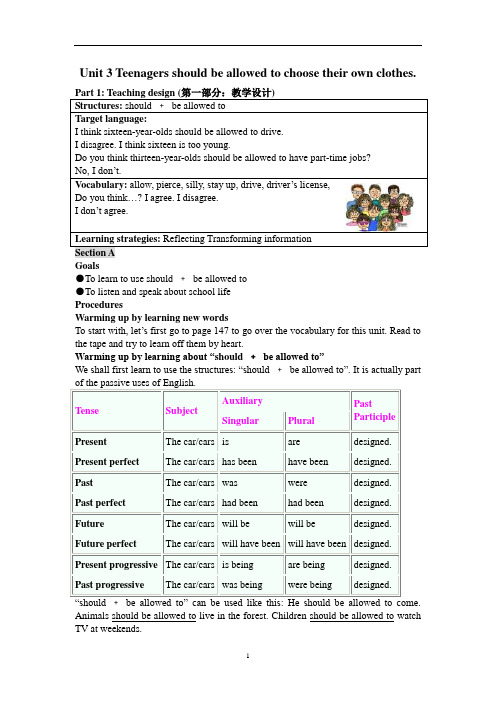
Unit 3 Teenagers should be allowed to choose their own clothes.Goals●To learn to use should ﹢be allowed to●To listen and speak about school lifeProceduresWarming up by learning new wordsTo start with, let’s first go to page 147 to go over the vocabulary for this unit. Read to the tape and try to learn off them by heart.Warming up by learning about “should ﹢be allowed to”We shall first learn to use the structures: “should ﹢be allowed to”. It is actually partAnimals should be allowed to live in the forest. Children should be allowed to watch TV at weekends.1a Reading and circlingFor practice of the “should ﹢be allowed to” r ead the statements in the box on page 18 and circle A for agree or D disagree.1b Listening and circlingListen and circle “T” for true or “F” for false beside the statements in the box on pageIn pairs look at the statements in activity 1a and makeconversation. You may use the phrases in the box on page 18A: I think teenagers should be allowed to go out with their friends.B: I agree. They are old enough.A: I think teenagers should be allowed to go to the mall with their classmates.A:I think teenagers should be allowed to get their driver’slicense.A: I think teenagers should be allowed to drive.A: I think teenagers should be allowed to get their ears pierced.A:I think teenagers should be allowed to watch TV at weekends.A: I think teenagers should be allowed to take the school bus.A: I think teenagers should be allowed to buy a new blouse at the mallA: I think teenagers should be allowed to choose their own clothes.B: I agree. They are old/ clever/ strong/ bright/ serious/ kind/ careful/ lucky/ enough. 2a Listening and checkingNext we are going to listen and check on page 19 what Kathy thinks. You may circleYou are going to listen again to the recording just now tonumber Kathy’s and Molly’s re asons in the correct order onpage 19.Next you are going to make in pairs a list of things teenagersshould and should not be allowed to do. Discuss your listwith your partner.A: Do you think teenagers should be allowed to drive?B: Yes, I think so.A: Do you think teenagers should be allowed to work late at night?B:No, I don’t think so. I don’t think they should be allowed to work late at night. They need to get enough sleep.A: Do you think teenagers should be allowed to disagree with their teachers?B: Yes, I think so.A: Do you think teenagers should be allowed to get tired doing their homework?B:No, I don’t think so.A: Do you think teenagers should be allowed to work every night?B: Yes, I think so.A: Do you think teenagers should be allowed to cut one’s hair?B: Yes, I think so. I kind of like my own style. It looks cool.A: Do you think teenagers should be allowed to have many friends?B:No, I don’t think so. They may meet bad people if they have too many friends. A: Do you think teenagers should be allowed to work on weekends?B: It depends on what they do. They may spend time with parents on weekends.3a Reading and writingYou are to read a dialogue between Sun Fei and Wu Yu on page 20.After reading you shall write in the chart Sun Fei’s and WuYu’s rules.Use “Don’t…” and “You can” to express your ideas.Jot down all the useful phrases form their dialogue.In pairs role play the conversation in 3a using the information in thechart on page 20.A: What rules do you have at home?B:Well, I’m not allowed to go out on school nights. How aboutyou?A:I’m not allowed to go out on school nights either. But I can watchTV with my sister.A: What rules do you have at school?B:Well, We’re not allowed to go out to movies on school nights. How about you?A:We’re not allowed to go out to movies on school nights either. But We can watch VCD with our teachers on the school playground.4 Doing groupworkTurn to page 20 and find someone in your group who has to g o home after school, who is allowed to stay up until 11:00 pm, who has to stay at home on school nights, who is allowed to watch TV every night, who had to clean up his room every morning.Write their names in the chart on page 20Closing down by reciting a kid poemAnother kid's poemThere is nothing under the bedOr on your closet floor,The monster is inside your headDon't worry anymore.It'll be there every nightIn your dreams to give you frightEvery time you turn off the lightAs long as you believe it.There is no monster on the stairsNor anywhere down the hallThis old house just settles at nightYou hear the creaks, that's allYou think you see a dragon peekThrough the window with a fang-ed beakAnd that's why you can't go to sleepAs long as you believe it.Mama loves you, daddy, tooAnd you will grow up tallNothing's going to happen to youWe'll take care of it all.You will be a fine young manA brave little boy who never ranWhatever you want to do, you canAs long as you believe it.So listen to me now, you poohIt's off to sleep right now with you.Daddy knows what you can doAs long as you believe it.SECTION BGoals●To read about rules of school●To talk about rules of schoolProceduresWarming up by talking about rulesHello, class. Are there any rules for us in this class? What are they? How were they made?Now list some of them and talk about them in pairs.1a Reading and checkingRead the questions on page 21 and write either “A” for always, “U” for usually, “S”In pairs you are to talk about your answers in activity 1a.I am going to play a dialogue to you. It is between a man and a boycalled Peter. They are talking about a math test. You are to listen andcircle the things in activity 1a you hear. While listening try to note theexpressions used.TapescriptListen again to the dialogue and match the sentence parts in the box onpage 21.Now copy down the expressions from the dialogue into your notebook.They are shown on the blackboard.2c Doing group workNext it’s reading time. Let’s read the article on page 22 and answer the questionsRole play a conversation using information from 3a.A:I think our school rules of always wearing school uniforms at school should be changed.B: Well, Mary and I talked about the rules the other day.A: At our school, we have to wear uniforms every day. That isbad for us.B: Yes, I agree. The problem is that all of us think the uniformsare ugly.A: I think young people should look smart and so we should beallowed to wear our own clothes.B: But our teachers believe that if we did that, we would concentrate more on our clothes than our studies.A: I disagree with them. We would feel more comfortable and that is good for studying. If we can't do that, we should be allowed to design our own uniforms. That would be a good way to keep both teachers and us happy.B:It’s also probably a good idea for parents to allow us to study in groups duringevening.A: I think so. I know we get noisy sometimes, but we learn a lot from each other.B: I also think that vacations should be longer.A:I agree with you on that. At present they're too short. Longervacations would give us time to do things like volunteering.B:Last summer I had an opportunity to volunteer at the localhospital, but I couldn’t because I had to go back to schools. It would be a good experience for me because I want to be a doctor when I'm older.A:Let’s go to talk to our teachers about the school rules after scho ol.B: OK! I agree with you!4 Making a list of rulesSuppose you and your friend are starting an English club. Make a list of rules aboutGet Up! Get Up!"Get up! Get up! Get out of bedyou lazy bum, you sleepyhead."Yes, that is what my mother saidat eight-oh-five today.She left the house and drove to work.She'll soon be feeling like a jerkwhen she finds out -- I have to smirk --Today is Saturday.--Kenn NesbittSELF CHECK1 Filling in blanksTo test your study this week you are to fill in each blank on page 23 with a correct word given. Change the form if it is necessary.2 Reading and writingYou are going to read the article on page 23 first and then write a letter to the editor agreeing or disagreeing. Explain your reasons.While you are reading cut the sentences into thought groups and underline the expressions.3. Helping and learningAt our school, we sometimes have a special day/ to help others. Last year/ we went to an old people’s home/ and sang songs/ and performed a play /for them. The old people were very happy. We should be allowed/ to take time/ to do things/ like that/ more often. For example, we should visit primary schools/ and help teach young students. I want to be a teacher/ when I'm older/ so it would be a great experience/ for me. Other students would like to do other jobs. For example, my friend Tian Ge wants/ to write for a newspaper. She should be allowed/ to volunteer/ at the newspaper office/ once a week. On Friday afternoons, many students are sleepy/ after a long week of classes. Some students should be allowed/ to have Friday afternoonsTo end this busy period we shall take time to learn and read aloud an English poem for kids.My FeetMy feet, my feet,I love my feet.I think they're great,I think they're neat.They're pretty, pink,and picturesque.They look so perfecton my desk.Unfortunately,sad to tell,they also havea funny smell.So though I'm fast,and though I'm fleet,and though at sportsI can't be beat,no team will pickme to compete,because they alwayssmell defeat.--Kenn NesbittReading: Should I be allowed to make my own decisions?Before you read, go over the new words for this part on 148.While you read, listen to the recording and underline all the expressions.Many teenagers have hobbies. But sometimes these hobbies can get in the way of schoolwork, and parents might worry about their child's success at school. Teenagers often think they should be allowed to practice their hobbies as much as they want. Do you agree?Liu Yu, a fifteen-year-old from Shandong, is a running star. He is in his school running team, and has always wanted to be a professional athlete. However, his parents won't allow him to train as much as he would like to. "Of course we want to see Liu Yu achieve his dreams,”says Mr Liu, “and we know how much he loves running. That's great, and my wife and I watched him in every one of his races. We have nothing against running! But we do think that our son needs to be realistic. Now he is getting older, he needs to think about what will happen if he doesn't become a professional runner in the end.”Liu Yu doesn't really agree. “Well, I think I should be allowed to make decisions formyself,”he says. “ My parents have always taught me the importance of working hard and not just to do what I enjoy. I understand this. But I'm serious about running. Being a professional runner is the only thing I have ever wanted to do.”Mr and Mrs Liu believe that Liu Yu should study hard in the evenings, and so they don't allow him to practice running on school nights. “I know this might seem strict,”says Mrs Liu, “but we think we're doing the right thing. He has to understand that very few people can become professional athletes. It's a very difficult dream to achieve. We don't allow him to practice every day because we think he needs to spend time on his homework.”But Liu Yu still doesn't agree. “I know my parents care about me,” he says. “But they are always talking about what will happen if I don't succeed. But I will succeed! I think I should be allowed to make this decision myself. Only then will I have a chance of achieving my dream.”After you read, read aloud the text again, to yourself, or to the tape and copy down all the expressions, too.Part 2: Teaching Resources(第二部分:教学资源)The Trouble with TeenagersPeople now care more about what teenagers are thinking about and feeling because they know there are hard moments in the life of teenagers.Varieties of troubles are seriously puzzling teenagers, such as hard study, the gap between parents and kids, relationship between themselves and their classmates, teachers and friends.Among them, the problem of "the generation gap" has become more and more obvious. The argument on this is widely spread. Different people hold different views. But we cannot fail to admit the fact that there are no hearts as delicate as those of teenagers, as everything is happening to them for the first time. Teenagers are certainly different from adults in many ways. They don't know the right way in which they can make everyone happy and satisfied. They are certainly lack of experience. That's why parents are always complaining about their being misunderstood. They say, they love their kids so much as to do everything for them. Is that the true love their children want? No, teenagers say, the true love which they long for should contain courage, correct guide and support instead of endless complaints about marks, marks, marks and strong pressure. So the teenagers are now even said to have been leading a harder life.The trouble with teenagers is that they haven't learned how to be controlled. Living life right down the middle, with all its attendant landmines, is all they know. It hasn't occurred to them to run in a zigzag pattern.They are more emotional than people think. If something serious happens to them, they will be deeply hurt. You can always hear the voice from a teenager that they haven't learned enough how to appear to be fine.The adults have recognized that they should show more care for the teenagers, especially their school life. Teenagers have their own special way of thinking.I have also got my own troubles. My grandpa passed away in September last year, which has greatly changed my life. He was even one of my best friends ever since I was born. He lived with my family for the past 18 years, the happiest time in his eyes.I have never admitted his death as a fact till now.Things which happened between us have come to my mind. All over again, I felt those powerful losses crisscrossing my own heart, and I know that when you say goodbye to a beloved grandparent, you say goodbye to something happy, something young in yourself. And that something never really returns and the pain never really goes away.No matter how hard a life the teenagers are leading, they will forever stand still and march forward straight and bravely.。
- 1、下载文档前请自行甄别文档内容的完整性,平台不提供额外的编辑、内容补充、找答案等附加服务。
- 2、"仅部分预览"的文档,不可在线预览部分如存在完整性等问题,可反馈申请退款(可完整预览的文档不适用该条件!)。
- 3、如文档侵犯您的权益,请联系客服反馈,我们会尽快为您处理(人工客服工作时间:9:00-18:30)。
Period 3 Section A Grammar Focus-4c【知识与能力目标】1) 学习掌握下列词汇:fridge, low, somebody, translate, lock, earthquake, sudden, all of a sudden, biscuit, cookie, instrument2)进行一步复习巩固学习Section A 部分所学的生词和词组。
3)进一步学习运用一般过去时态的被动语态。
4) 掌握主动语态变被动语态的方法,并通过不同方式的练习,来熟练运用。
【过程与方法目标】在本课的任务型语言教学中,我将依据课程的总体目标并结合教学内容,创造性地设计贴近学生生活实际的任务活动,吸引和组织他们积极参与,使学生通过观察、思考、讨论、交流和合作等方式,在一种自然、真实或模拟真实的情境中体会语言、掌握语言的应用。
【情感态度价值观目标】培养想象力,善于观察事物。
面对难题,用积极的态度去解决,发挥想象力,认识世界,改造世界。
【教学重点】1) 学习生词fridge, low, somebody, translate, lock, earthquake, sudden, all of a sudden, biscuit, cookie, instrument2) 复习巩固Section A 部分所学的生词和词组,达到熟练运用的目标。
【教学难点】1) 一般过去时态的句子变为被动语态。
2) 综合运用所学的知识进行练习运用。
【教学步骤】Step 1. Warm- up and revision1. Have a dictation of the new words learned in the last class.2. Review some main phrases we learned in the last class. Check the homework.3. Let some Ss tell something about how tea was invented by accident.Tell something about how tea was invented by accident.One day Shen Nong was boiling drinking water over an open fire. Some leaves from a tea plant fell into the water and remained there for some time.It produced a nice smell so he tasted the brown water. It was quite delicious and one of the world’s favorite drink was invented.Tell something about Lu Yu and his Cha Jing.Lu Yu “the saint of tea” mentioned Shen Nong in his book Cha Jing. The book describes how tea plants were grown and used to make tea. It also discusses where the finest tea leaves were produced and what kinds of water were used.It is believed that tea was brought to Korea and Japan during 6th and 7th centuries. In England, tea didn’t appear until around 1660. The tea trade from China to Western countries took place in the 19th century.Step 2. Grammar Focus.1. 学生阅读Grammar Focus中的句子,然后做填空练习。
① 拉链是什么时候被发明的?______ _____ the zipper ________?② 它于1893年被发明。
It ______ _________ in 1893.③ 它是由谁发明的?______ _____ it invented ______?④ 它是由惠特科姆•贾得森发明的。
It _____ _______ _____ Whitcomb Judson.⑤ 茶叶什么时候被带到朝鲜去的?_____ ______tea ________ to Korea?⑥ 茶叶在六到七世纪之间被带到朝鲜。
It _____ _______ to Korea ________the 6th and 7th centuries.⑦ 热冰淇淋勺用来做什么?What ____ the hot ice-cream _____ _____?⑧ 它用于挖很冷的冰淇淋。
It’s _____ ______ ______ really cold ice-cream.⑨ 电话机在1876年被贝尔所发明。
The telephone _____ ________ _____ Alexander Graham Bell in 1876.⑩ 贝尔于1876年发明了电话机。
Alexander Graham Bell _________ the telephone in 1876.2. 学生们根据记忆,看大屏幕来完成填空练习。
3. 学生们完成填空试题后,可以打开课本检查答案,对错误的句子,单独进行强化记忆。
Step 3. Grammar一般现在时的被动语态中讲到的“被动语态的用法”和“如何将主动语态(含“主+谓+宾”句型的句子)变为被动语态”同样适用于一般过去时的被动语态,不同的只是这两种时态的被动语态的“构成”,所以这里我们重点讲解一般过去时的被动语态的构成(was / were +及物动词的过去分词)及在各种句式中的运用。
1. 肯定句:主语+ was/were +及物动词的过去分词+ 其他.e.g. The bridge was built three years ago. 这座桥是三年前修建的。
2. 否定句:主语+ was/were not +及物动词的过去分词+ 其他.e.g. Women were not allowed to take part in the games at first. 开始妇女不允许参加奥运会。
3. 一般疑问句:Was/Were +主语+及物动词的过去分词+ 其他?e.g. Were these pictures drawn by your sister? 这些图片是由你妹妹画的吗?肯定回答Yes, 主语+ was / were.Yes, it was.否定回答No, 主语+ was / were + not.No, it wasn’t.4. 特殊疑问句:疑问词(不作主语)+ was / were +主语+ 及物动词的过去分词(+ by短语) + 其他?e.g. When was the bridge built?【拓展】1. 有些短语动词相当于及物动词,变为被动句时介词或副词不能去掉。
e.g. They put off the meeting because of the weather.The meeting was put off because of the weather.2. 含有双宾语的主动句变为被动句时,通常把指“人”的间接宾语变为主语,指“物”的直接宾语保留不变;如果把指物”的直接宾语变为主语,则在间接宾语前加to或for。
e.g. My aunt gave me an e-dictionary yesterday.I was given an e-dictionary yesterday.An e-dictionary was given to me yesterday.3. 主动句中感官动词see/hear/watch/feel等和使役动词make/let/have等后跟省略to的动词不定式,变为被动语态时应加上不定式符号to。
e.g. I saw a heavy man enter the house.A heavy man was seen to enter the house.4. 系动词、不及物动词或某些短语动词(happen, take place, come true, fall asleep…)没有被动语态。
e.g. What happened to Mr. Brown?5. 含复合宾语(宾语+ 宾语补足语)的主动结构变被动结构时,通常把主动结构中的宾语改为被动结构中的主语,而宾语补足语保留在谓语动词后面成为主语补足语。
主动结构:I found him lying on the floor.被动结构:He was found lying on the floor by me.Step 4. ExercisesI. 根据各题后括号内的要求完成下列各题,每空一词(含缩略形式)。
1. My mother cleaned the room this morning. (改为被动语态)The room ________ _______ by my mother this morning.2. Was the model plane made by your brother? (补全肯定答语)________, it __________.3. The bag was stolen last week. (改为否定句)The bag ______ _______ last week.4. The criminal was caught yesterday. (对划线部分提问)_________ _________ the criminal ________?II. 将下列句子改为被动语态,每空一词。
1. We put off the meeting.The meeting _________ ________ ________ by us.2. Mother made me a new skirt.A new skirt _________ _________ ___________ me by Mother.3. They asked me to help them.I __________ ___________ ___________ ____________ _____________.Answers: I. 1. was cleaned 2. Yes; was 3. wasn’t stolen 4. When was; caughtII. 1. was put off 2. was made for 3. was asked to help themStep 5. PracticeWork on 4a:1. Tell Ss to read the sentences in 4a and rewrite the sentences using the passive voice.2. 做题方法点拨示例:① 点拨:原句为一般过去时态,原句的谓语动词为sold,宾语为the fridge;改为被动语态时,应将the fridge 作主语,谓语动词用was sold的形式。
